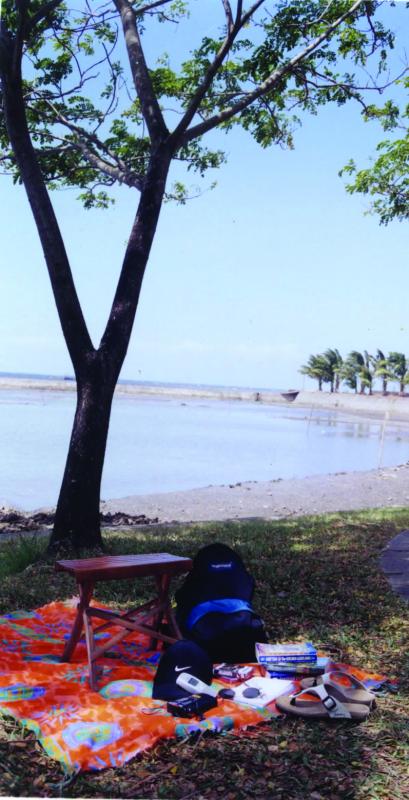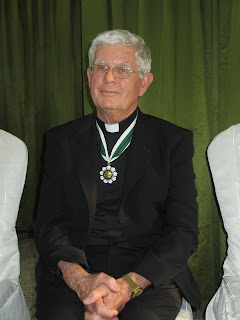Misyon Online - September-October 2014
Pulong ng Editor

Apostolic Journey of Pope Francis
13-18 August 2014, Republic of Korea
In his address to the bishops of Korea on 14 August during is apostolic journey to that country Pope Francis reflected with them ‘as a brother bishop on two central aspects of the task of guarding God’s people in this county: to be guardians of memory and to be guardians of hope’.
Pope Francis went on to say, ‘How can we be guardians of hope if we neglect the memory, the wisdom and the experience of the elderly, and the aspirations of our young?’
The song Koinonia, a Greek word meaning 'Communion', was written for the Apostolic Journey of Pope Francis to the Republic of Korea by K-Pop singer Noh Young-Shim and produced by Won Dong-Yeon for the Archdiocese of Seoul. The singer here is Sumi Jo, an internationally renowned soprano from Korea who sang before the Beatification Mass and also at Communion time during the Mass. |
Read story...

COLUMBAN ORDINATIONS
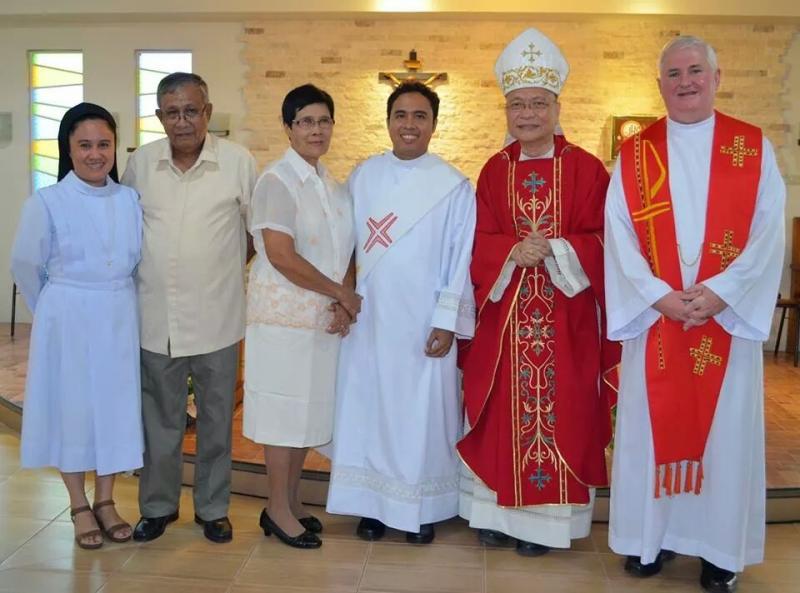
The Reverend Jason with Sr Regina Cesar ASOLC, a cousin, his parents
Wilfredo and Amalia, Bishop Ontioco and Fr Raymond Husband, Rector of the
Columban Formation House.
On 29 June, the Solemnity of Sts Peter and Paul and the 96th anniversary of the official founding of the Missionary Society of St Columban, Bishop Honesto F. Ontioco ordained Jason Jason Antiquera as deacon in the chapel of the Columban House of Studies, Cubao, Quezon City.
The new deacon is from San Isidro Labrador Parish, Binalbagan, Diocese of Kabankalan. The diocese, created in 1987, covers the southern part of the province of Negros Occidental and was formerly part of the Diocese of Bacolod. The Columbans were invited in 1950 to develop the church in that area.
Read story...
CLM MISSION-SENDING
The mission-sending of Luda Egbalic and Jenaydel Nola, who form PH21, took place on 14 May with Mass celebrated by the Regional Director Fr Patrick O’Donoghue at the Columban Lay Mission Center, Cubao, Quezon City. Both are from Mindanao, Luda from Bukidnon (Diocese of Malaybalay), and Jen form Maitum, Sarangani (Diocese of Marbel). They are now in Korea.
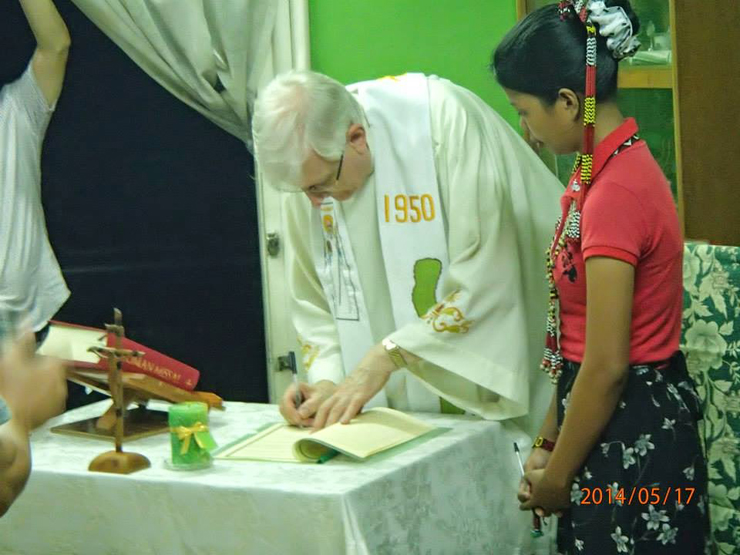
Fr Patrick O’Donoghue signing contract of Jenanydel Nola.

Read story...

PETER DONG’S VOCATION STORY
By Richelle H. Verdeprado
As he recalled his missionary story, Peter Dong or Lee Chon, a 32-year-old Columban seminarian, journeyed back to Jilin province, in the central part of northeastern China. Reminiscing about his hometown and childhood he recalled how his family has always been with him. He told how he would travel 20 kilometers with his parents and brother on bicycles on Sundays to attend Mass. Consequently, talking with him gave me an idea of how it is to live in a village where your family was the only Catholic one and you have to close your windows and doors when you pray. It made me realize then how God can still continue working in our lives despite all the barriers the world can build. It made me realize that faith can still grow beautifully amidst unfavorable circumstances.
Peter Dong and Richelle H. Verdeprado
After finishing middle school, Peter started thinking about the path he would be taking. He wasn’t physically strong, thus, he could not just take any course. His father opened to him the idea of entering the seminary. Instantly, his mind remembered their place which had a chapel it but had no priest. Though he knew very little about what it is to be a priest, he had just no objection. He didn’t know where such adesire to try was coming from. He just found himself one day with his 21 classmates, preparing themselves to become diocesan priests.
Read story...

COLUMBAN GENERAL COUNCILLORS VISIT MYANMAR

The author was elected to the General Council of the Columbans in 2012 as was Fr Darwin Bayaca. This photo was taken just after their election. L to R: Fr Arturo Aguilar, Vicar General (USA, ordained 1984, Regional Director in the USA when elected and served before in Chile), Fr Patrick Colgan (Ireland, ordained in 1994, serving in Fiji when elected), Fr Kevin O'Neill, Superior General (Australia, ordained in 1992, served in China when elected), and Fr Darwin Bayaca (Gingoog City, Misamis Occidental, Philippines, ordained 2005, Vice Director and Rector of Formation in the Philippines when elected, served in China before).
During the second half of a hot June, FrPat Colgan and Fr Darwin Bayaca, both members of the General Council of the Missionary Society of St Columban in Hong Kong, visited Myanmar; the Society is reengaging with Myanmar, formerly known as Burma, in multiple ways at this time:
a. The Society accepted three young men as seminarian candidates, to join our Program in Manila later this year. They are currently living in a simple bamboo 'Columban Accompaniment' house in Mandalay, following a program of prayer, studies and pastoral outreach with Fr Neil Magill.
Read story...

INSTALLATION OF FR LEO DISTOR, FIRST FILIPINO COLUMBAN PARISH PRIEST OF MALATE
On the Feast of St Joseph the Worker, 1 May, Columban Fr Leo Distor was installed as Parish Priest of Our Lady of Remedies Parish, Malate, Manila, where the Columbans have worked since 1929 having taken the parish at the invitation of Irish-born Archbishop Michael O’Doherty of Manila at a time when the Philippines was desperately short of priests.
Installation Mass. L to R: Fr Distor, Fr De Claro, Fr Patrick O’Donoghue (then Regional Director)
Read story...

A BIG THANK YOU TO AN EXTRAORDINARY WOMAN
This article first appeared in the Mabuhay section of the Sunday Examiner, the English-language weekly of the Diocese of Hong Kong, in the 29 June 2014 issue.

‘She was a pillar of strength and a beam of hope to all of those who are fighting for life against death’, Magdalena Soleño said at a memorial Mass for the late founding coordinator of the Filipino Migrant Cancer Support Services (FILMCASS), Melina Paller Lagarbe, celebrated on 15 June in the chapel of the Canossian Sacred Heart College of Commerce in Central.
Read story...

FROM PING-PONG DIPLOMACY TO INTERFAITH CRICKET RELATIONS
This story, datelined Karachi, Pakistan, first appeared in Sunday Examiner, the English-language weekly of the Diocese of Hong Kong, on 30 August this year.
Ping-pong diplomacy played a big role in thawing the ice during the communication freeze between the United States of America and the People’s Republic of China back in 1971, but today, the governor of the Sindh in Pakistan, IshratulEbad Khan, is taking cricket beyond the frigid zone to cool sometimes overheated interfaith and inter-cultural relations by building healthy friendships through sport.
A keen cricketer himself and avid fan of the sport, IshratulEbad has thrown his support behind the upcoming game between a Vatican XI and the Archbishop of Canterbury’s XI to be played at ‘the St Peter’s Basilica’ of cricket, Lords Cricket Ground, in England, in September.
Read story...

ANOTHER MYEONG SEK: THE ROAD TO EMMAUS
By Fr Noel O’Neill
Columban Fr Noel O’Neill founded Emmaus Industries to help better the lives of the differently abled. He lives and works in South Korea.
Myeong Sek, Theresa, was special. She was special because she was differently abled.
Fr O’Neill with Myeong Sek
She was special because it was she who accompanied me as together we first began to walk the Road to Emmaus. After 25 years in parish ministry I sought permission from my superiors to begin a new apostolate, a ministry to persons with special needs.
Read story...

PEACE BY PEACE
And the more we love each other, the more we should give of ourselves to one another until it hurts. We cannot say, ‘I love God, but I don’t love my neighbor’. St John tells us that he who says he loves God but not his neighbor, is a liar. How can you love God who you do not see, if you don’t love the neighbour who you do see- the neighbour you know and live with every day?
Read story...

OUR HIDEAWAY
Our Hideaway is a
venue for the youth to express themselves and
to share with our readers their mind, their heart and their soul.
‘Are you ready to Say ‘Yes’? Pope Francis to AYD2014.
By Richelle H. Verdeprado

We gave Our Hideaway in this issue to Pope Francis instead of to a young reader. We included extracts from his address and homily to the delegates to the Sixth Asian Youth Day (\AYD2014)’ Editorial in Korea in August. Assistant Richelle H. Verdprado writes her own response to the challenge of Pope Francis and invites five young friends to do the same. We extend that invitation now to all our readers, whether young or old.

The author Richelle with Chad and Jessan
The words of Pope Francis made a strong impact on me. I took everything he said to heart because I know that he really intended to address it to young people like me. What moved me the most was, ‘Dear young friends, in this generation the Lord is counting on you! He is counting on you!’
Read story...

Pulong ng Editor

Apostolic Journey of Pope Francis
13-18 August 2014, Republic of Korea
In his address to the bishops of Korea on 14 August during is apostolic journey to that country Pope Francis reflected with them ‘as a brother bishop on two central aspects of the task of guarding God’s people in this county: to be guardians of memory and to be guardians of hope’.
Pope Francis went on to ask, ‘How can we be guardians of hope if we neglect the memory, the wisdom and the experience of the elderly, and the aspirations of our young?’
The song Koinonia, a Greek word meaning 'Communion', was written for the Apostolic Journey of Pope Francis to the Republic of Korea by K-Pop singer Noh Young-Shim and produced by Won Dong-Yeon for the Archdiocese of Seoul. The singer here is Sumi Jo, an internationally renowned soprano from Korea who sang before the Beatification Mass and also at Communion time during the Mass. |
In his homily in Korea on the Solemnity of the Assumption the Bishop of Rome emphasized again the link between the past and the present: ‘As Korean Catholics, heirs to a noble tradition, you are called to cherish this legacy and transmit it to future generations. This will demand of everyone a renewed conversion to the word of God and a passionate concern for the poor, the needy and the vulnerable in our midst’.

6th Asian Youth Day AYD2014)
13-17 August 2014, Republic of Korea
At the closing Mass of the Sixth Asian Youth Day Pope Francis spoke words that gladdened the heart of your no longer young editor with memories of being told countless times when young that he was ‘the future of the Church/Nation/Whatever’: ‘As young Christians, whether you are workers or students, whether you have already begun a career or have answered the call to marriage, religious life or the priesthood, you are not only a part of the future of the Church; you are also a necessary and beloved part of the Church’s present! You are the Church’s present!’
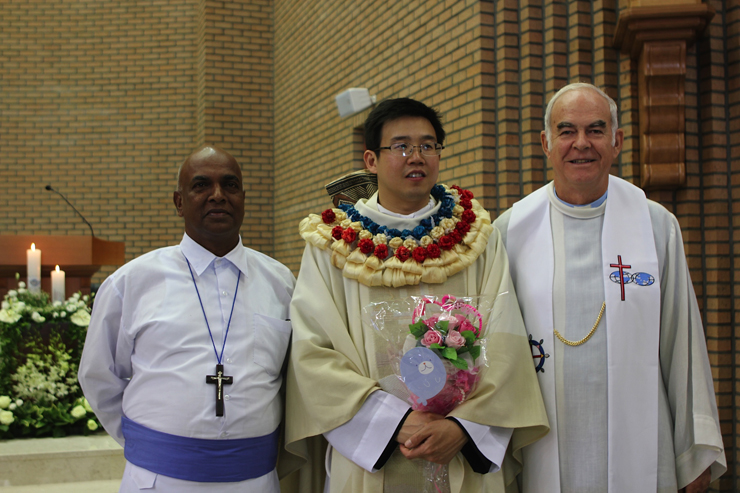
Newly ordained Korean Columban Fr Carlo Euikyun Jung with Mr Gyan Want, a
catechist and Fr Carlo’s Hindi teacher in Fiji, and Fr Francis Hoare, Columban
Vice-Director, Fiji. Mr Want is wearing the garb of catechists in Fiji.
The above photo, taken after the ordination on 1 May of Fr Carlo Eiukyun Jung in Korea, expresses much of what Pope Francis was to say months later. Mr Gyan Want has, as a catechist, been transmitting the faith ‘to future generations’ for many years along with the cultural heritage of the Indian-Fijians who make up more than 40 percent of the population of Fiji. Fr Francis Hoare knew Columban co-founder Fr John Blowick, as did all Irish Columbans who studied for the priesthood up to his death in 1972. When your editor entered the Columban seminary in Ireland in September 1961 Father John was still teaching theology, though he retired from teaching two or three years later.
Those of us who knew Fr Blowick, as part of transmitting the faith ‘to future generations’, have been called to pass on what inspired him and our other Co-Founder Bishop Edward Galvin, nearly 100 years ago. Both were very young priests at the time, the then ‘part of the future of the Church’ but who were ‘also a necessary and beloved part of the Church’s present’ at that time.
Many of us older Columbans have experienced a sense of loss at the reality of so few coming after us. But now we see the new present and future emerging in young men like Father Carlo and others like him from Australia, Chile, China, Fiji, Korea, Myanmar/Burma, Peru and Tonga following in the footsteps of Fr Blowick and Bishop Galvin as disciples of Jesus. We see it in the many young Columban Lay Missionaries from many countries who are doing the same.
And we have seen in all the countries to which we were sent something that perhaps our founders could not have imagined but which Pope Francis pointed out to the bishops of Korea: ‘From being a land of mission, yours has now become a land of missionaries’.
A big thank you to an extraordinary woman
This article first appeared in the Mabuhay section of the Sunday Examiner, the English-language weekly of the Diocese of Hong Kong, in the 29 June 2014 issue.

Praying for Melina.
‘She was a pillar of strength and a beam of hope to all of those who are fighting for life against death’, Magdalena Soleño said at a memorial Mass for the late founding coordinator of the Filipino Migrant Cancer Support Services (FILMCASS), Melina Paller Lagarbe, celebrated on 15 June in the chapel of the Canossian Sacred Heart College of Commerce in Central.
A woman who in many ways was everything she should not have been, the strongly private Lagarbe had always seen herself as the quiet achiever, choosing to make what was described as her highly significant contribution to life, society and the community far away from the public view.
Melina with then Philippine Consul-General Noel Servigon.
However, an experience when visiting a cancer patient caused her to think again about taking up the job of coordinator, of what was then known as Buhay Ka, and saw her blossom into what Soleño described as a softly-spoken, kind leader of unusual competence and intelligence, with the incredible skills able to forge a large group of volunteers into a viable and tightly-knit service organization for the support of cancer victims.
However, after giving her all to bring strength and courage to those fighting for life, Melina herself was diagnosed with cancer in late 2013 and after a long struggle for life, died at home in Ozamiz City, Philippines, on the evening of 8 May.
Melina addressing a rally.
‘We are truly blessed to have been part of her final journey’, Soleño said. ‘It is truly tough to believe she will not be with us again, but she is united in vision and mission in the effort to build hope through spreading love, embracing frailty and taking her legacy forward in doing so’, she continued.
Speaking to the around 200 people who gathered to celebrate the life and mourn the death of the much loved and respected community leader, Lya Tababa told of Lagarbe’s struggle with herself.
She described the stoic manner in which she bore the sometimes vitriolic criticism that came her way as she quietly worked at truly fulfilling the role of a servant-leader in the community.
‘Thank you for always being there to encourage and cook, and always look after us’, Soleño said in a tribute.
Speaking on behalf of the Philippine Consulate General, the labor attaché, Manuel Roldan, recalled that a gathering of FILMCASS in Chater Road was one of the first community events he attended after coming to Hong Kong. He described his surprise at seeing the smiles on the faces of the cancer victims at the function. ‘Melina always told people, “Smile when you visit a cancer patient. You have to bring hope and cheer, not express your own grief in seeing their suffering”’, he related.
FILMCASS street fiesta
/ prayer rally / walk in Chater Road, Central, Hong Kong.
Melina became frustrated when friends cried at her bedside, as they allowed their own grief to overcome the lesson she had worked so hard to instill in them. She firmly believed that pity weeps, but walks away.However, compassion comes to help and stay and that is the basis on which she sought to build the care offered by the FILMCASS volunteers.
She continued to fight for her life even when her body had been eaten up by the cancer growing inside of her and remained her generous self until the end, reaching out to anyone in the same hospital ward who needed support and encouragement.
The spiritual adviser to FILMCASS, Canossian Sr Vicky Ramos FdCC , reminded the gathering that while Melina was still a strong dynamic in binding the group together that she is not FILMCASS, and that the challenge of today was to accept her legacy and use it positively. ‘FILMCASS needs you all’, she said.
The group sang some of Melina’s favorite songs during the memorial Mass, with the words, ‘As we gather may we glorify your name . . . we’ll be blessed because we came’ striking a deep chord in the hearts of all.
The director of the Diocesan Pastoral Centre for Filipinos, Good Shepherd Sr M. Felicitas Nisperos RGS, gave a tribute to the humble service that Melina had given her compatriot migrant workers and Fr Jay Francis Flandez SVD, the incoming chaplain to the Filipino community in Hong Kong, reflected that Melina understood well that life means service and in this way she inspired people to live their lives with love. He also noted she had a strong faith in the promise of Jesus that life is forever and drew her strength from her belief that we do not live our whole life on this earth.
Melina once confessed that all she wanted to do was live an ordinary life, but it was not until she lay dying in a hospital bed that she understood that she was then sharing the most ordinary, basic and common experience of human existence.
She lived well and consequently died well and we are richer for having walked on the soil which is graced with the footprint of Melina Paller Lagarbe.
May she rest in peace.
Smile when you visit a cancer patient. You have to bring hope and cheer, not express your own grief in seeing their suffering.
—Melina Lagarbe
You may read more about
Melina’s work in Hong Kong in
Sunday Examiner here
and
here.
Melanie Lagarbe as I knew herBy Fr James Mulroney Melina knew quite a few Columbans around Ozamiz City, but not so recently as she came to Hong Kong over 30 years ago and had not lived there since. Before that she was in Manila studying for a few years. Her father was a lawyer with a big interest in human rights and did a lot of pro bono work. She was greatly blessed with wonderful employers in Hong Kong who looked after her like one of their own family. They are beautiful people who always supported her in her work with the cancer patients as well and remain benefactors of the group. She was a most extraordinary woman who struggled with the limelight for the sake of the suffering. Convincing her to take on the job was a long struggle. But she was extremely competent and once she made the decision to do it she went ahead in leaps and bounds. I miss her greatly, but many others miss her even more. Nevertheless, she was not the organization and sickness continues and so must the service to the migrants suffering with cancer. She has good successors in the support group and they are doing well. |
Another Myeong Sek: The Road to Emmaus
By Fr Noel O’Neill
Columban Fr Noel O’Neill founded Emmaus Industries to help better the lives of the differently abled. He lives and works in South Korea.
Myeong Sek, Theresa, was special. She was special because she was differently abled.
Fr O’Neill with Myeong Sek
She was special because it was she who accompanied me as together we first began to walk the Road to Emmaus. After 25 years in parish ministry I sought permission from my superiors to begin a new apostolate, a ministry to persons with special needs.
With Myeong Sek at the grave of
You Ha
Myeong Sek had been abandoned by her parents when she was a few years old and ended up in ‘The Beggars Camp’, Mudeong Institution, which I frequently visited while in parish ministry. After much negotiation with the authorities there I succeeded in getting permission for Myeong Sek to leave and to join with me and a volunteer as we moved into a two-story house in a residential part of the city. It was October 1981. This was the first attempt in Korea of offering people with special needs the opportunity of living in the local community.
Myeong Sek’s funeral Mass
Myeong Sek’s funeral Mass
Early in 2012 Myeong Sek was diagnosed with cancer. She spent the last ten days of her life in a hospice. A hospice and Emmaus have something in common. A hospice is for people dying whose ailment cannot be cured. Emmaus is for intellectually disabled people whose disability cannot be cured. A visit to either one alerts us to the preciousness of each moment of life; it arouses within us a sense of gratitude.
While Myeong Sek was in the hospice I visited her every day. As I sat beside her bedside and held her tiny hand, we reminisced about the funny incidents we had shared together throughout the previous 30 years, the times we used to sing Kaptori Wa Kapsoni (a Korean popular duet) and dance the hokey pokey.
Kaptori Wa Kapsoni
As she laid back on her bed she would break into a broad smile, a loving smile, sending me a message that no words could express. They were happy moments, happy days, happy years.
That smile also hid the many wounds and hurts she had endured in her lifetime. I was only too well aware of those painful wounds. Watching the peaceful look on her face I felt she already sensed the heavenly welcome. She could almost make the dying words of St Thérèse, the Little Flower, her own: ‘I am not dying, I am entering into life’.
Myeong Sek was waked for three days at the funeral home. Those who had lived with her in the group home were dressed in mourning black dress, and they greeted those who came to pay their respects, present and former staff members who had known her for many years. Many Catholic friends and sponsors came who were touched and moved by their relationship with Myeong Sek. This tiny, fragile woman had the gift to make them feel loved and at peace with themselves as they struggled with their problems.
Myeong Sek often said, ‘When I die, those who come to the wake, feed them well’. They came in large numbers to pay their respects and all ate well. Before leaving as each one ate and departed you could almost sense the presence of Myeong Sek as she said kamsahamnida,’thank you, thank you’.
At the cemetery
The funeral Mass was held at the parish church Myeong Sekused to attend. Six priests concelebrated for a packed congregation. I chose for the Gospel the story of the two disciples on the Road to Emmaus. As the two disciples eyes were opened at seeing Jesus break the bread, so also my eyes were opened by my relationship with Myeong Sek. This tiny, fragile woman, who could not read or write, who had no concept of time or money, was my teacher, my professor. We need to invite and welcome more Myeong Seks into our society because they will surprise us with the manner they can touch our inner selves and help us to welcome our weaknesses, our old age with graceful and peaceful courage. Yes, Myeong Sek was differently abled.
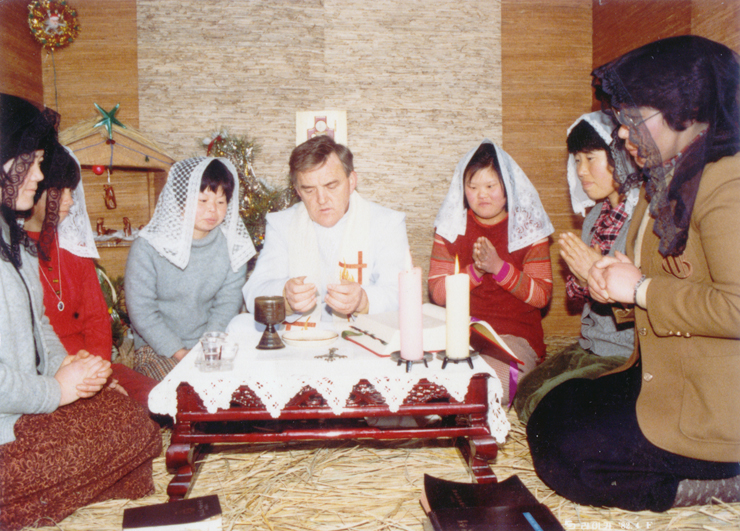
Mass with the Emmaus Community, Myeong Sek in grey
CLM Mission-sending
The mission-sending of Luda Egbalic and Jenanydel Nola, who form PH21, took place on 14 May with Mass celebrated by the Regional Director Fr Patrick O’Donoghue at the Columban Lay Mission Center, Cubao, Quezon City. Both are from Mindanao, Luda from Bukidnon (Diocese of Malaybalay), and Jen form Maitum, Sarangani (Diocese of Marbel). They are now in Korea.

Fr Patrick O’Donoghue signing contract of Jenanydel Nola.
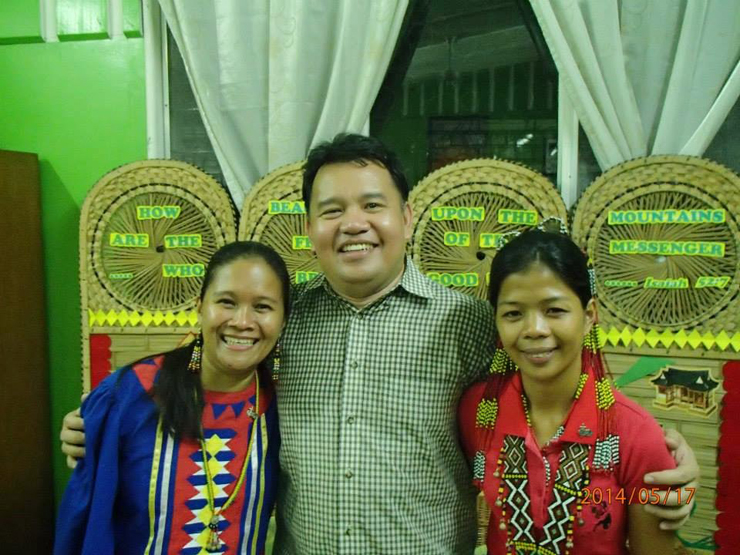
Luda Egbalic, John Din, then Coordinator, CLM Philippines, and Jenanydel Nola
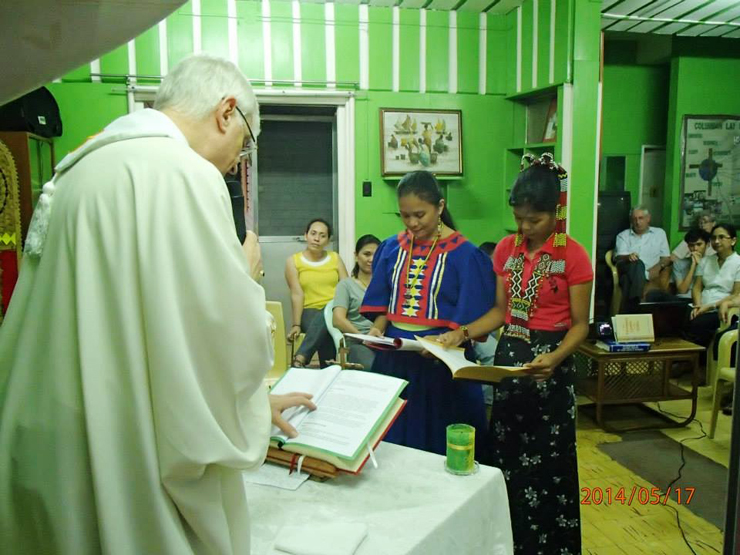
Mission-sending Mass at St Columban’s Lay Mission Center, QC, celebrated by
Fr Patrick O’Donoghue
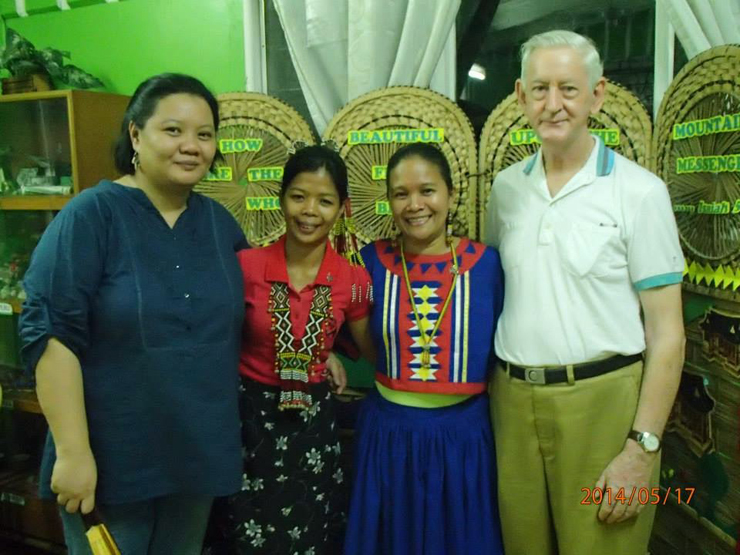
Ivy May Carpio, former member of PH 21, Jenanydel, Luda and Fr Patrick Baker
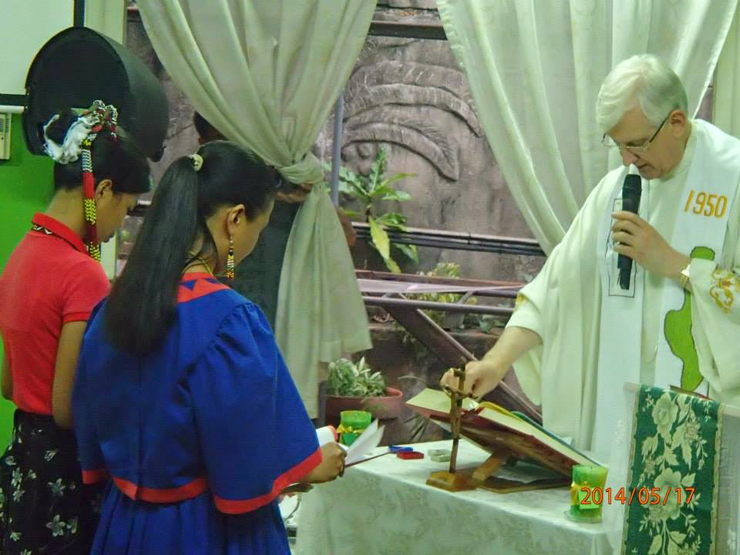
Mission-sending Mass
Columban General Councilors Visit Myanmar
by Fr Patrick Colgan
A
song celebrating the 75th anniversary of the arrival of the Columbans in
Banmaw (Bhamo) and the 50th anniversary of the building of St Patrick's, now
the cathedral of the Diocese of Banmaw.

The author was elected to the General Council of the Columbans
in 2012. This photo was taken just after their election. L to R: Fr Arturo Aguilar, Vicar General (USA, ordained 1984, Regional Director in the USA when elected and served before in Chile), Fr Patrick Colgan (Ireland, ordained in 1994, serving in Fiji when elected), Fr Kevin O'Neill, Superior General (Australia, ordained in 1992, served in China when elected), and Fr Darwin Bayaca (Gingoog City, Misamis Occidental, Philippines, ordained 2005, Vice Director and Rector of Formation in the Philippines when elected, served in China before).
During the second half of a hot June, Fr Pat Colgan and Fr Darwin Bayaca, both members of the General Council of the Missionary Society of St Columban in Hong Kong, visited Myanmar; the Society is reengaging with Myanmar, formerly known as Burma, in multiple ways at this time:
a. The Society accepted three young men as seminarian candidates, to join our Program in Manila later this year. They are currently living in a simple bamboo 'Columban Accompaniment' house in Mandalay, following a program of prayer, studies and pastoral outreach with Fr Neil Magill.
b. The Society is in the process of assigning a small team of newly ordained priests, which we hope will be matched with a team of Lay Missionaries, to the country in 2015, initially to learn Burmese, the official language of Myanmar, and the cultures of the country in Yangon, to be followed by ministry in the Kachin area in the north where Columban priests worked between 1936 and 1977. Korean Columban Fr Carlo Jung Euikyun, ordained on 3 May and who spent two years on First Mission Assignment in Fiji as a seminarian will be among those going to Myanmar.
c. The Society continues to support Fr Neil Magill's wonderful Higher Education Centre, which provides a three-year education that includes English, Information Technology (IT), Human Rights, Spirituality, World Religions, Ecology, Leadership, and now recognized at Diploma level by La Salle University, Manila, for over a hundred of the poorest but brightest young people of northern Myanmar.
d. The Society, under the auspices of the Australian government-registered ‘Columban Overseas Aid Fund’ supports a very large Rural Education infrastructure of schools, teachers, boarding houses and livelihood preservation, in the dioceses of Myitkyina and Banmaw in Kachin State. Many of the children being educated are refugees from the renewed fighting between the Army of Myanmar and Kachin Independence forces.
Fathers Pat and Darwin were able to visit and have discussions with local partners about the four areas above. We ask your support and prayers that these initiatives will bear fruit.
Columbans in Burma/MyanmarThe first group of Columban priests, led by Fr Patrick Usher, went to Burma in October 1936 to the Kachin State, the northernmost state in the country. Monsignor Usher became Prefect Apostolic in 1939 of the then new Prefecture of Bhamo, which covered most of the Kachin State. This area had been under the care of the Paris Foreign Missionaries for many years. He died suddenly on 13 October 1958. Fr John Howe, who had gone to Burma in 1937, succeeded Monsignor Usher as Prefect Apostolic and then became first Bishop of Myitkyina [‘MITCH-in-awe’] when the prefecture was made into a diocese in 1961. Bhamo and Myitkyina, 130 kms apart, are the two main centers of population in the area. On 3 April 1976 Fr Paul Zingtung Grawng, a priest of the diocese, was ordained as auxiliary bishop and on 9 December that year succeeded Bishop Howe. Bishop Grawng became Archbishop of Mandalay in 2003 and retired earlier this year. On 28 August 2006 the new Diocese of Banmaw (Bhamo) was created, with territory taken from Myitkyina. St Columban is the patron of the cathedral in Myitkyina and St Patrick of that in Banmaw. The Columban Sisters first went to Burma in 1947 but had to leave in 1966, as did most of the Columban priests, because of government policy. The Sisters were able to return in 2003. A small group of Columban Lay Missionaries worked in the Diocese of Banmaw from 2009 to 2012 and it is planned to send more to Myanmar in the near future. In 2011 the Catholics of the area celebrated the 75th anniversary of the arrival of the Columbans. In the video above there are shots of St Patrick’s Cathedral, Banmaw. The song was written and sung by Sr Teresa Nyangh Pi FMM. Other videos made on the occasion of the Jubilee and which include group photos of Columban priests who worked in the area are here, here and here. Despite the many years when Columbans who had served there couldn’t even visit Myanmar very close ties remained and still remain. In November 2009 Bishop Michael Smith of Meath, the diocese in Ireland where the Irish headquarters of the Columbans are situated, visited Banmaw. People in the Diocese of Meath have been giving support to the Diocese of Banmaw. In the video below Bishop Smith refers to the special significance of St Patrick, the patron saint of the Diocese of Banmaw and its cathedral, for his diocese.
You can find more videos connected with the celebration by googling ‘Banmaw, Jubali’ on YouTube. |
Columban Ordinations

The Reverend Jason with Sr Regina Cesar ASOLC, a cousin, his parents
Wilfredo and Amalia, Bishop Ontioco and Fr Raymond Husband, Rector of the
Columban Formation House.
On 29 June, the Solemnity of Sts Peter and Paul and the 96th anniversary of the official founding of the Missionary Society of St Columban, Bishop Honesto F. Ontioco ordained Jason Jason Antiquera as deacon in the chapel of the Columban House of Studies, Cubao, Quezon City.
The new deacon is from San Isidro Labrador Parish, Binalbagan, Diocese of Kabankalan. The diocese, created in 1987, covers the southern part of the province of Negros Occidental and was formerly part of the Diocese of Bacolod. The Columbans were invited in 1950 to develop the church in that area.
The Reverend Jason spent time in both Peru and Korea on his First Mission Assignment before resuming his studies in Quezon City.
On 3 May Bishop John Baptist Jung Shinchuel, auxiliary bishop of the Diocese of Inchon, Korea, ordained the Reverend Carlo Jung Euikyun to the priesthood and Augustine Lee Jehoon to the diaconate. The ceremony took place in St Joseph the Worker Parish, Yeonso Dong, Diocese of Inchon, the home parish of Father Carlo.
Father Carlo is now in Myanmar/Burma. He spent his two-year First Mission Assignment in Fiji while the Reverend Jehoon came to the Philippines for his.
The Reverend Augustine Lee Jehoon will be ordained to the priesthood on 1 November in his home parish of Our Lady of Fatima, Yeouido, Archdiocese of Seoul, where he is currently serving as a deacon. The Reverend Jason Antiquera, who is currently assigned to Malate Parish, Manila, will be ordained in his home parish on 7 January 2015.
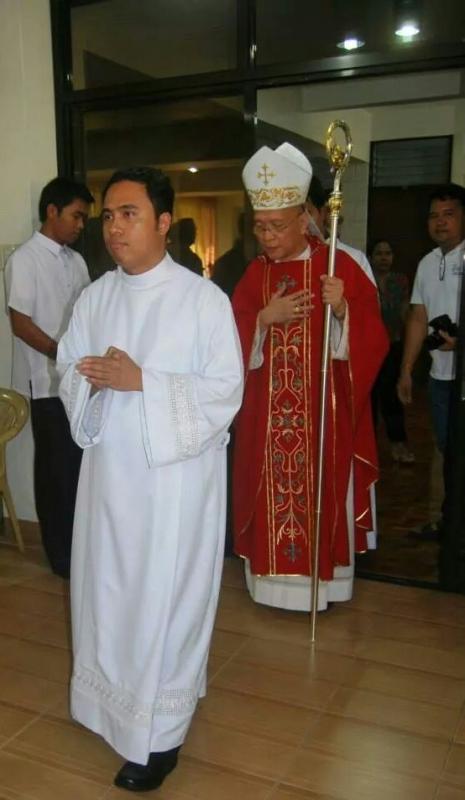
Jason and Bishop Ontioco during the entrance procession
Ninth form the left: Reverend Jason, Bishop Ontioco, Reverend Augustine Lee
Jehoon.
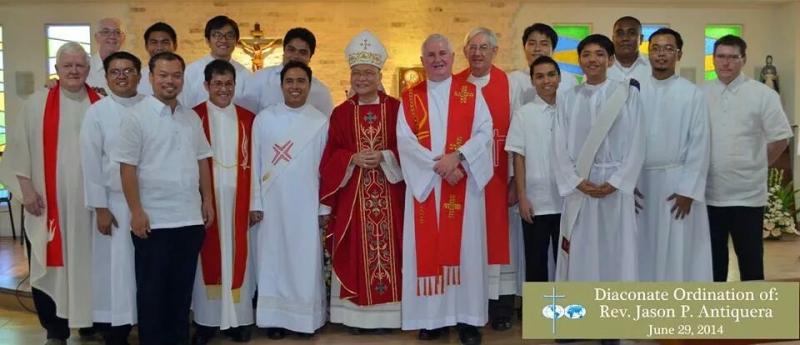
The Reverend Jason with Bishop Ontioco, Columban priests and students.
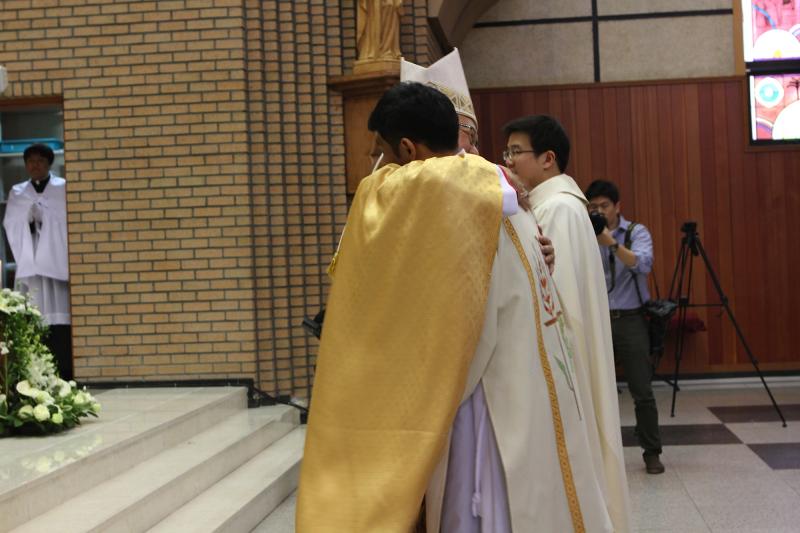
Bishop John Baptist Jung Shinchuel giving the Sign of Peace to the Reverend
Augustine Lee Jehoon
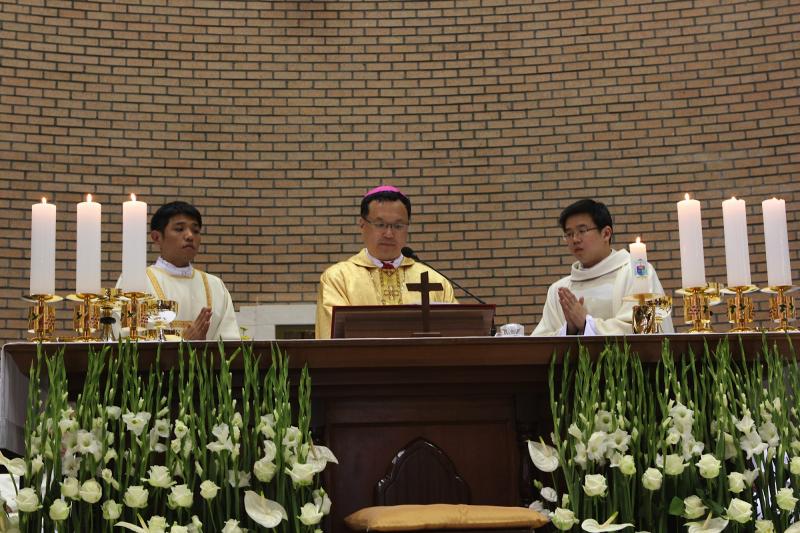
During the Ordination Mass: Rev, Jehoon, Bishop Jung, Father Carlo.
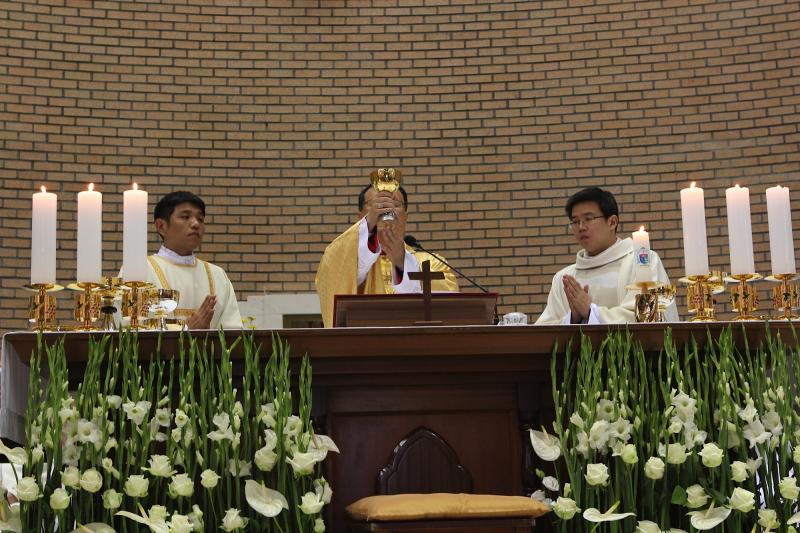
During the Ordination Mass: Rev, Jehoon, Bishop Jung, Father Carlo.
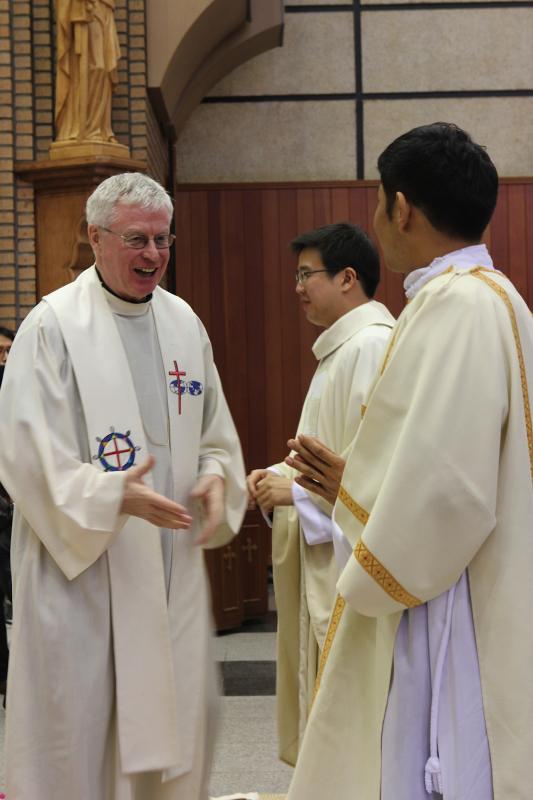
Columban Regional Director, Fr Donal O'Keeffe, congratulates the
Rev. Jehoon
and Father Carlo after the ordination Mass.
Discovering the Different Faces of Jesus
By Richelle H. Verdeprado
As he recalled his missionary story, Peter Dong or Lee Chon, a 32-year-old Columban seminarian, journeyed back to Jilin province, in the central part of northeastern China. Reminiscing about his hometown and childhood he recalled how his family has always been with him. He told how he would travel 20 kilometers with his parents and brother on bicycles on Sundays to attend Mass. Consequently, talking with him gave me an idea of how it is to live in a village where your family was the only Catholic one and you have to close your windows and doors when you pray. It made me realize then how God can still continue working in our lives despite all the barriers the world can build. It made me realize that faith can still grow beautifully amidst unfavorable circumstances.
The author and Peter after their interview.
After finishing middle school, Peter started thinking about the path he would be taking. He wasn’t physically strong, thus, he could not just take any course. His father opened to him the idea of entering the seminary. Instantly, his mind remembered their place which had a chapel it but had no priest. Though he knew very little about what it is to be a priest, he had just no objection. He didn’t know where such a desire to try was coming from. He just found himself one day with his 21 classmates, preparing themselves to become diocesan priests.
Peter sharing his story, during his visit to Misyon office.
It was a moment of self-discovery and knowing God more. But it wasn’t a smooth journey for Peter. He was shy and silent inside the seminary. Thus, his formator sent him home and told him to try to find himself first. He was 17 years old that time and took his formator’s words to heart. He knew he had to find himself, although that appeared still vague to him.
His mother warmly welcomed him home and told him to study another course. But his father advised him to go to their relatives for a while as it was the middle of the school year. That appealed to him. He had never traveled that far all by himself. He prepared himself for that.
Enjoying the company of his new friends.
It was an enjoyable 16-hour trip by train and four hours by bus. But what has made the trip even more exciting was that at the end of it he would be able to see his aunts and cousins. That made him reflect that in his life, if he wanted to become a priest, he needed to go through the process too. He had to patiently ‘travel’ if he wanted to be ‘home.’
One day, his father visited him and asked him what he wanted to do. He knew, this time with conviction, that he still wanted to become a priest, and so would do his best in the seminary.
Peter had the chance to visit one of the urban poor areas in Bacolod City.
But something happened in the midst of his studies. His diocese was about to be merged with another only three seminarians from his diocese were left. His two companions decided to transfer to the other diocese while he was unsure of where he would go. It was at this time that he got to know the Columban missionaries. One of his classmates introduced him to Fr Kevin O’Neill, an Australian priest who is now Superior General. Father Kevin was looking for people to join them in their mission.
Peter told himself, as before, that he felt the desire to try. This time he understood the need to be open to more learning and experiences. The journey wasn’t always smooth. He encountered difficulties learning English and adjusting to many things. Sometimes his mother would ask him to come home and that would make him miss his family more. But Peter knew the desire in his heart and where he was being called and was determined to fulfill this desire and so successfully finished his theology course in China in 2011.
Before meeting the Columbans, Peter wasn’t really interested in studying English. In Wuhan, China, he spent eight months studying the language. The Columbans had taught him another way of seeing things. Peter said, ‘It was really difficult. Before I didn’t like to learn English and thought that I would not pass’. But Father Kevin would always encourage him. Moreover, he was continually inspired by Columban leaders from other countries but spoke Mandarin in China.
‘We leave our country and our family to go to another country in order to work as God’s missionaries. We do this to discover different faces of Jesus from different nations and different languages.’ These words of Father Kevin deeply touched him. They have been a challenge and an inspiration to him on how he could become someone who could show the face of Jesus wherever he found himself.
Meeting these fisherfolks in Brgy. Magsungay has allowed Peter to experience
and indeed discover the different faces of Jesus.
Peter is presently in Spiritual Year, having last year studied in a program on Missiology and Justice and Liberation in Manila. He is continually amazed at the way Filipinos relate to one another. Though he does not yet speak Filipino, his heart can understand the warmth and kindness of the people. Asked about his realizations as a seminarian, he shared the message of Columban Fr David Clay, ‘To be a missionary is not a job. It’s a joy’. That is his life now according to him: a life that is faced with instabilities and challenges, but is filled with so much joy.
You may email Richelle at editorialassistant@misyononline.com.From ping-pong diplomacy to interfaith cricket relations
This story, datelined Karachi, Pakistan, first appeared in Sunday Examiner, the English-language weekly of the Diocese of Hong Kong, on 30 August this year.
Ping-pong diplomacy played a big role in thawing the ice during the communication freeze between the United States of America and the People’s Republic of China back in 1971, but today, the governor of the Sindh in Pakistan, Ishratul Ebad Khan, is taking cricket beyond the frigid zone to cool sometimes overheated interfaith and inter-cultural relations by building healthy friendships through sport.
A keen cricketer himself and avid fan of the sport, Ishratul Ebad has thrown his support behind the upcoming game between a Vatican XI and the Archbishop of Canterbury’s XI to be played at ‘the St Peter’s Basilica’ of cricket, Lords Cricket Ground, in England, in September.
However, the governor has bigger plans in the making and is looking to expand the concept by inviting the two teams to come to Pakistan in 2015 for a Tri-Series Tournament that will include the Governor of the Sindh’s XI, to create friendship and dialogue across religious and cultural differences.
At the Governor’s Residence in Karachi on July 8, Ishratul Ebad gave concrete support to the St. Peter’s Cricket Club, popularly dubbed the Vatican XI, when he presented a check for US$2,000 (Php87,000) and six test-quality (international standard), made-in-Pakistan cricket bats to the team.
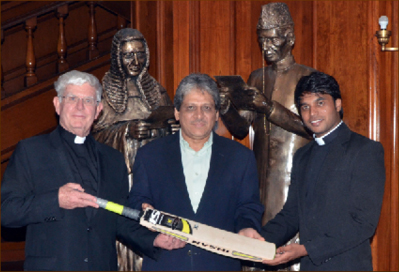
A member of the committee of the St Peter’s Cricket Club, Fr Robert McCulloch, and a Pakistani seminarian who has been selected as the team’s wicket-keeper, Aamir Bhatti, accepted the cheque and bats from Ishratul Ebad (above).
Coming from a country where few things can capture the attention and imagination of the population, or unite in the manner of the national cricket team, the Pakistani governor added that he intends to arrange for a current or past test (international) player from Pakistan to travel with the Vatican XI as a coach during its tour of England.
Fr McCulloch who spent over 34 years as a missionary in Pakistan after seven years in Mindanao, Philippines, and is currently the Procurator General of the Columbans and based in Rome, passed on the thanks of Monsignor Melchor Sanchez de Toca, the secretary of the Pontifical Council for Culture, which is sponsoring the team.
The Vatican will also play a game against a Royal Household XI at Windsor Castle and some other teams while on tour in England.
All proceeds from the games will be donated to the Global Freedom Network, a joint Anglican-Catholic-Muslim anti-trafficking charity.

A ball being bowled. From back to front -- umpire (with hat), wicket, non-striking batsman (yellow), bowler (blue), ball, pitch, crease, striking batsman (yellow), wicket, wicket keeper (blue, crouching) and fielder (blue, slip position) [Wikipedia]
Both the Vatican XI and the Archbishop of Canterbury’s XI are made up of priests and seminarians. The Vatican side chose its players from the residents in various theological colleges around Rome and it includes eight Indians, two Sri Lankans, one Pakistani, one Englishman and one Irishman.
The committee is made up of Australian, English, Irish, Sri Lankan and Spanish representatives, leading Monsignor de Toca to comment that the team has a truly international face, especially with the addition of a Pakistani coach.
Monsignor de Toca said in a letter to the governor of the Sindh, ‘The team (Vatican XI) brings together the best players from many international seminaries in Rome and includes one Pakistani representative from Karachi.’
He added, ‘Inundated as we have been with requests for television documentaries and interviews from major international newspapers, it has been a joy to watch, as the initiative has peacefully taken up its proper, universal character and articulated its international face.’
He added that the club has become a true expression in Rome of the Asian cultural values that have been engendered into the game of cricket, with its gentlemanly way of life, fierce competition, intricate skill and great tradition of hospitality.
One of the big pushes behind the cricket team comes from the Australian ambassador to the Vatican, John McCarthy. He told Vatican Radio in January, ‘Anything that properly builds interfaith and intercultural relations, understanding and exchange, the Commonwealth of Australia sees as an important part of our diplomacy.’
The plan has also received widespread support from bishops in the cricketing world, many of whom are known for only being available to members of their flock who are at the cricket when international test matches are being played in their dioceses.
Ishratul Ebad said that he is delighted that a Pakistani has been included in the Vatican XI and that Pakistan will continue to provide support to help the Vatican develop its cricket team.
|
|---|
Father McCulloch described Ishratul Ebad as a leading advocate and supporter of interfaith harmony and dialogue in Pakistan, pointing out that the governor said that he is delighted to be of assistance and to offer ‘a gift for our friends in the Vatican as a token of friendship.’
Standing in the shadow of the a statue depicting the swearing in of the first governor-general of Pakistan, Quaid-e-Azam Muhammad Ali Jinah, who articulated a dream of a free Pakistan in his inaugural speech to the new nation in 1947, Father McCulloch, Bhatti and Ishratul Ebad resonated with his words, ‘You are free; you are free to go to your temples, you are free to go to your mosques or to any other place of worship in this state of Pakistan.’
If Ishratul Ebad can marry his cricket dream with Jinnah’s vision, maybe the only thing that will remain to be said is, “How’s that!!!”*
*In cricket an umpire can only give a batsman out if the fielding team appeals to him to make a decision. Traditionally this is expressed in the words, ‘How’s that?’ In the excitement of the moment this mostly becomes an impassioned scream, often accompanied by extreme gestures of supplication, ending up in a slur that sounds something like Owzzzat?
The phrase has come to epitomize the game.
A taste of cricket – with Irish music in the background
Installation of Fr Leo Distor, First Filipino Columban Parish Priest of Malate
On the Feast of St Joseph the Worker, 1 May, Columban Fr Leo Distor was installed as Parish Priest of Our Lady of Remedies Parish, Malate, Manila, where the Columbans have worked since 1929 having taken the parish at the invitation of Irish-born Archbishop Michael O’Doherty of Manila at a time when the Philippines was desperately short of priests.
Installation Mass. L to R: Fr Distor, Fr De Claro, Fr Patrick O’Donoghue (then Regional Director)
The parish of Malate, one of the oldest in the Philippines, was established on 8 September 1588 by Augustinian friars. Fr Leo Distor, who has worked in the formation of Columban seminarians in Chicago and in Quezon City, is fromMarbel, Mindanao, where he was ordained in 1996. He is the first Filipino Columban parish priest of Nuestra Señora de los Remedios.
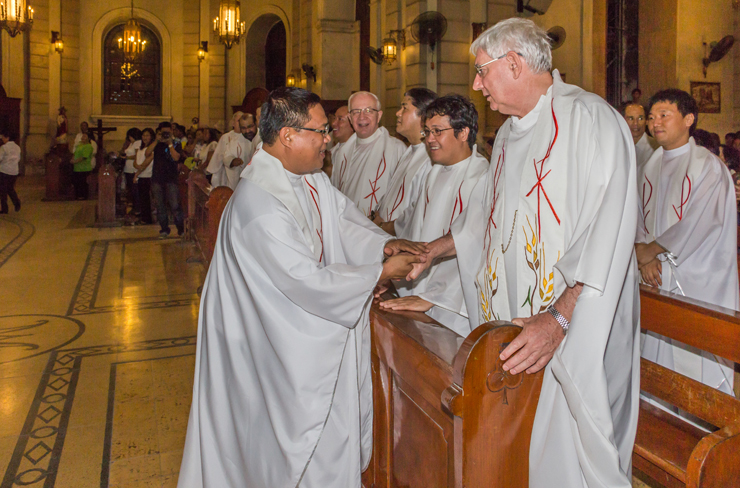
Fr Leo greeting Fr Dan O’Malley, then Regional Vice-Director and a former parish priest of Malate.
Father Leo was installed by Fr Sanny C. De Claro, Vicar Forane of the Vicariate of Nuestra Señora de Guia, which includes Malate Parish. Fr De Claro is Rector and Parish Priest at the Archdiocesan Shrine of Nuestra Señora de Guia that also serves as the parish church of Ermita, which is next to Malate.
Fr Leo with friends after the installation Mass.
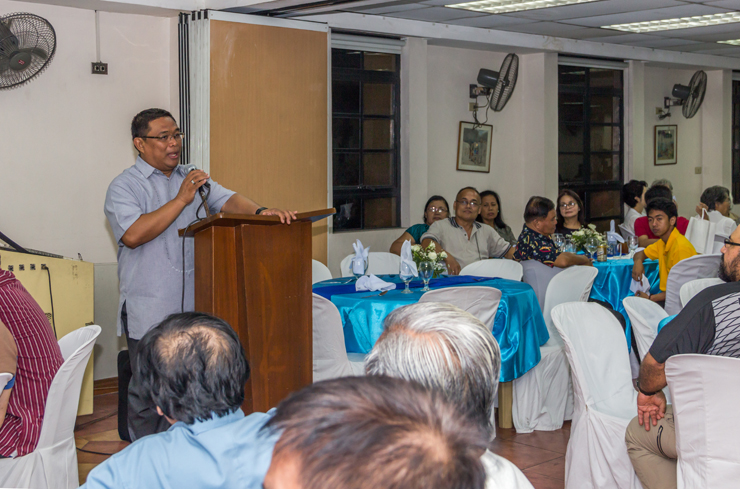
Fr Leo speaking at the reception afterwards.
Filipino Columban priests at the installation. L to R: Fr Rex Rocamora (China), Fr Philip Bonifacio (Japan), Fr Andrei Paz (China), Fr Leo Distor, Fr Darwin Bayaca (Central Administration, Hong Kong), Fr Cireneo Matulac (Columban House of Studies, Quezon City), Fr Jovito Dales (Vocations, Philippines), Fr Rodolfo Christopher Kaamiño IV (Taiwan).
Frs Cireneo Matulac, Kevin McHugh and Leo Distor.
Website of Malate Church:
www.malatecatholicchurch.org
Father Joeker

By Fr Joseph Panabang SVD
English, MOI?

I asked a man in Piazza Republica in Rome, ‘Excuse me, sir, what time does the train leave?’ ‘Sorry, I don’t speak English, French,’ he answered curtly. Huh, he said he doesn’t speak English, but wasn’t what he just said English
MODERN DAY SAMARITANS

Fr Thomas Aschman SVD gave a crash course on Mission and Renewal in Rome. He touched on the Samaritan woman in the gospel and said, ‘Today, there are only about 500 Samaritans.’ ‘No!’ I strongly objected, to his shock. ‘We have more in the Philippines and they all live in the island of Samar.’ The Filipinos in the group erupted in gales of raucous laughter.
QUIP DISASTER

Sr Rose Fernando FMM from Sri Lanka gave a week-long course on global warming. With scientific evidence flashing on an overhead projector, she demonstrated how the ice in the northern hemisphere will melt and consequently cause the sea level to rise. She said that many cities will be under water, with Sri Lanka and the Netherlands affected most. ‘That’s why it’s called “Netherlands” because it is neither land nor water,’ I butted in for a conclusion. Oops, bad joke. Sr Rose didn’t find that funny!
KUNG-FU GHANA STYLE

Fufu, a combination of plantain, cassava and yam pounded in a mortar, is one of Ghana’s staple foods. ‘Do you have fufu in Asia?’ an enthusiastic villager asked me. ‘No, but we have Kung Fu,’ I replied, to his delightful laughter. Chinese action movies are well patronized here in Ghana. One can see youngsters imitating Kung Fu karate style in the street or at the entrance to a movie theater.
Peace by Peace

And the more we love each other, the more we should give of ourselves to one another until it hurts. We cannot say, ‘I love God, but I don’t love my neighbor’. St John tells us that he who says he loves God but not his neighbor, is a liar. How can you love God who you do not see, if you don’t love the neighbour who you do see- the neighbour you know and live with every day?
It is very important to understand that love has to hurt to be true. It hurt Jesus to love us. It truly hurt him. And to insure that we would be reminded of his great love, he made himself the Bread of Life to satisfy our hunger for his love. We hunger for God because we have been created to love. We have been created in his image and likeness. We have been created to love and to be loved. For that reason, he became man to make it possible for us to love as he has loved us.
Jesus became the hungry, the naked, the homeless, the sick, the imprisoned, the forsaken, and the unwanted in our midst. And he says, ‘And you did it unto me’. They are hungry for our love. That is the hunger of our poor. That is the hunger that you and I must meet, because it may even exist in our own homes.
See, here is where love finds its place. Poverty comes into our homes to give us the chance to love.
- One Heart Full of Love, Blessed Mother Teresa(26 August 1910 – 5 September 1997)

Sculpture of St John Chrysostom, St Patrick’s Cathedral, New York [Wikipedia]
Do you want to honour Christ’s body? Then do not scorn him in his nakedness, nor honor him here in the church with silken garments while neglecting him outside where he is cold and naked. For he who said: This is my body, and made it so by his words, also said: You saw me hungry and did not feed me, and inasmuch as you did not do it for one of these, the least of my brothers, you did not do it for me. What we do here in the church requires a pure heart, not special garments; what we do outside requires great dedication.
- From homily on St Matthew, St John Chrysostom (c.347 – 407; feast day 13 September)

Pope Francis in Korea [Wikipedia]
This afternoon I would like to reflect with you on part of the theme of this Sixth Asian Youth Day: ‘The Glory of the Martyrs Shines on You’. Just as the Lord made his glory shine forth in the heroic witness of the martyrs, so too he wants to make his glory shine in your lives, and through you, to light up the life of this vast continent. Today Christ is knocking at the door of your heart, of my heart. He calls you and me to rise, to be wide awake and alert, and to see the things in life that really matter. What is more, he is asking you and me to go out on the highways and byways of this world, knocking on the doors of other people’s hearts, inviting them to welcome him into their lives.
This great gathering of Asian young people also allows us to see something of what the Church herself is meant to be in God’s eternal plan. Together with young people everywhere, you want to help build a world where we all live together in peace and friendship, overcoming barriers, healing divisions, rejecting violence and prejudice. And this is exactly what God wants for us. The Church is meant to be a seed of unity for the whole human family. In Christ, all nations and peoples are called to a unity which does not destroy diversity but acknowledges, reconciles and enriches it.
- Address of Pope Francis to the AYD2014 delegates, Shrine of Solmoe, Korea, 15 August 2014.
The Beatitudes, L’Arche, Bognor Regis, England
Our Hideaway
By Regina Fabularum
Regina Fabularum is a student at St Scholastica's College, Manila
Searching for a Best Friend

Since I started studying at SSC, I’ve been searching for a ‘best friend,’ meaning … a person who would always be there for me especially when I’d have problems, who would accept me for who I am, who would listen to my stories truthfully, who would make me happy if I was in a bad mood, who would guide and protect me from danger, who would understand my feelings and who would love me. I might have had friends, but not the kind of friend I was looking for.
My Acquaintances
When I was in first year, we were four in our barkada, if I could call it such. Maybe they were just acquaintances during break times. I wasn’t able to picture real friendship with them. When I was in second year, I found another set of friends. We were three in the barkada, which I called at the time. But now I don’t know. We were happy with each other because we were only three. Perhaps, the fewer, the closer and so the better. We were called the ‘Powerpuff Girls’ because we were inseparable. My closest friend was ‘Blossom,’ for she wanted pink. My coolest friend was ‘Bubbles,’ for she wanted blue, and I was ‘Buttercup,’ for I wanted green. This was the greatest barkada I found so far in my present school. I thought they would be my best friends, but that didn’t last. The ‘Powerpuff Girls,’ who were known as inseparable before, parted ways last year. ‘Bubbles’ joined the barkada of her best friend, and ‘Blossom’ found a new best friend. I was left with no one. Sometimes I felt discriminated against, unloved and left out. That’s why I kept on praying to God our Father to send me a best friend.
Realizations
All I prayed for was granted except for the best friend I’d been longing for. I got high grades in academics. I won a quiz bee. My family was at peace. But still I couldn’t find the best friend I’d longed for. I thought of all that had happened in my life. I realized that my life had been wonderful. Despite the many pains I’d encountered, I found hope. I recalled being confined in hospital in a critical condition. We all prayed together for my recovery, and our prayers were heard. After five days I was cured. I was very thankful to God the Father and to Jesus our Savior. I also remembered when I almost died because of a toothache. I prayed to the Santo Niño to help me recover. After I prayed, the pain had gone.
With my memories, I wondered who was behind these acts of kindness, who was always there for me, who was solving my problems, who was protecting me, who was listening to my emotions, and who was loving me. Then I realized that it’s no other than Jesus who had been my best friend since I was a child. It was just that I hadn’t noticed it.
My Best Friend
When I found my best friend Jesus, I started telling him my daily stories. I always trust him and lift up to him my worries. He always helps me and guides me wherever I am. He always makes me happy. I’m contented having him as a best friend. Jesus could be your best friend too if you really wish. Jesus is my best friend, and he is the best friend of all for he is a friend forever. Remember, ‘Jesus is the same yesterday, today and forever’ (Heb 13:8).
You may contact Regina at reg_mf08@yahoo.com

